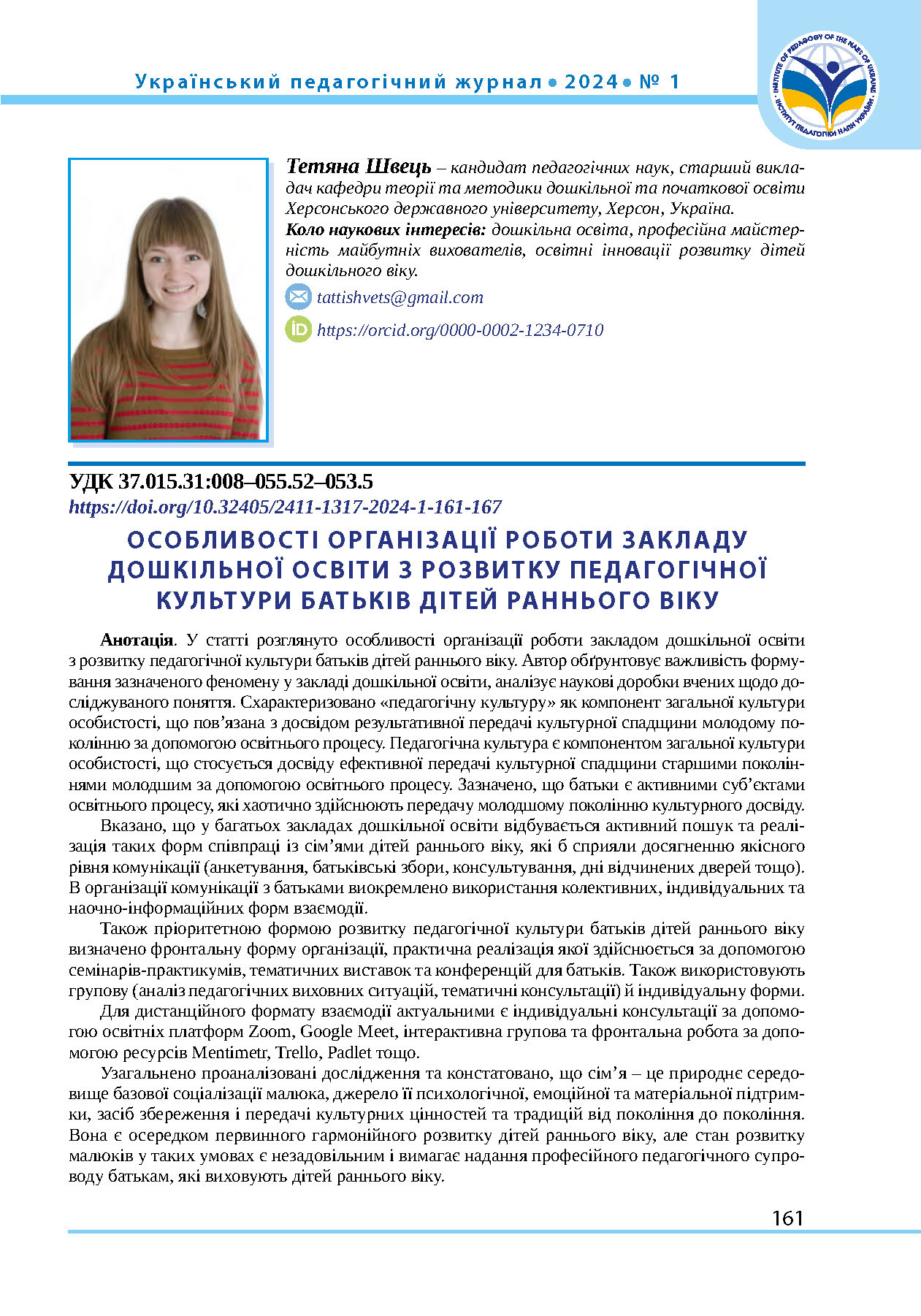Анотація
У статті розглянуто особливості організації роботи закладом дошкільної освіти з розвитку педагогічної культури батьків дітей раннього віку. Автор обґрунтовує важливість формування зазначеного феномену у закладі дошкільної освіти, аналізує наукові доробки вчених щодо досліджуваного поняття. Схарактеризовано «педагогічну культуру» як компонент загальної культури особистості, що пов’язана з досвідом результативної передачі культурної спадщини молодому поколінню за допомогою освітнього процесу. Педагогічна культура є компонентом загальної культури особистості, що стосується досвіду ефективної передачі культурної спадщини старшими поколіннями молодшим за допомогою освітнього процесу. Зазначено, що батьки є активними суб’єктами освітнього процесу, які хаотично здійснюють передачу молодшому поколінню культурного досвіду.
Вказано, що у багатьох закладах дошкільної освіти відбувається активний пошук та реалізація таких форм співпраці із сім’ями дітей раннього віку, які б сприяли досягненню якісного рівня комунікації (анкетування, батьківські збори, консультування, дні відчинених дверей тощо). В організації комунікації з батьками виокремлено використання колективних, індивідуальних та наочно-інформаційних форм взаємодії.
Також пріоритетною формою розвитку педагогічної культури батьків дітей раннього віку визначено фронтальну форму організації, практична реалізація якої здійснюється за допомогою семінарів-практикумів, тематичних виставок та конференцій для батьків. Також використовують групову (аналіз педагогічних виховних ситуацій, тематичні консультації) й індивідуальну форми.
Для дистанційного формату взаємодії актуальними є індивідуальні консультації за допомогою освітніх платформ Zoom, Google Мeet, інтерактивна групова та фронтальна робота за допомогою ресурсів Mentimetr, Trello, Padlet тощо.
Узагальнено проаналізовані дослідження та констатовано, що сім’я – це природнє середовище базової соціалізації малюка, джерело її психологічної, емоційної та матеріальної підтримки, засіб збереження і передачі культурних цінностей та традицій від покоління до покоління. Вона є осередком первинного гармонійного розвитку дітей раннього віку, але стан розвитку малюків у таких умовах є незадовільним і вимагає надання професійного педагогічного супроводу батькам, які виховують дітей раннього віку.
Посилання
Бєлєнька, Г. В. (2019). Дошкільний заклад і родина: співпраця заради дитини. Дошкільне виховання, 2, 3–6.
Борин, Г. В. (2009). Організаційно-педагогічні умови підготовки майбутніх вихователів до роботи з батьками дітей раннього віку. [Автореф. дис. канд. пед. наук, Тернопіль].
Воронов, В. А. та ін. (Уклад). (2020). Концепція освіти дітей раннього та дошкільного віку (проєкт). НАПН України.. http://naps.gov.ua/ua/press/announcements/1763/
Косенко, Ю. М. (2009). Система професійної підготовки кадрів дошкільної освіти: пріоритети ХХІ століття. Формування професійної компетентності вихователя дошкільного навчального закладу в умовах глобалізації. Збірник наукових праць, 45–48.
Машовець, М. А. (2005). Теоретичні засади формування готовності до педагогічної взаємодії з батьками у майбутніх вихователів. Збірник наукових праць Бердянського державного педагогічного університету (Педагогічні науки), 2, 148–153.
Огієнко, О. І. Андрагогічна модель навчання у професійному розвитку особистості в умовах трансформації освіти. Наукові записки Ніжинського державного університету імені Миколи Гоголя. Серія: Психолого-педагогічні науки, 3, 36–39.
Рогальська-Яблонська, І. П., Рогальська, Н. В. (2019). Компетентнісний підхід як основа формування здоров’язбережувальної компетентності дітей дошкільного віку. Вісник Черкаського національного університету імені Богдана Хмельницького. Серія: «Педагогічні науки», (10–11). https://ped-ejournal.cdu.edu.ua/article/view/3194
Швець, Т.А. (2022а). Групова взаємодія здобувачів дошкільної освіти як основа формування впевненості в собі. Український педагогічний журнал, 3, 149–155, https://uej.undip.org.ua/index.php/journal/article/view/620/582
Швець, Т.А. (2022b). Організація мовленнєво – ігрової діяльності здобувачів дошкільної освіти в контексті розвитку мовлення особистості дитини. Педагогічні науки. 99, 25–29. https://ps.journal.kspu.edu/index.php/ps/article/view/4511
Швець, Т.А. (2022c). Формування професійної майстерності майбутніх вихователів закладів дошкільної освіти. Science and innovation of modern world. Proceedings of the 3rd International scientific and practical conference. Cognum Publishing House. 410–414. https://sci-conf.com.ua/iii-mizhnarodna-naukovo-praktichna-konferentsiya-science-and-innovation-of-modern-world‑24-26-11-2022-london-velikobritaniya-arhiv/.
Швець, Т.А. (2016). Педагогічні умови формування професійної майстерності майбутніх вихователів дошкільних навчальних закладів. [Дис. канд. пед. наук, Херсонський державний університет].
Hodgkinson, K. W. (2010). Parental involvement and assistant principal efficacy. www.Proquest.com
Parke, R. D., & Buriel, R. (2007). Socialization in the family: Ethnic and ecological perspectives. Handbook of child psychology, 3.
Bielienka, H. V. (2019). Doshkilnyi zaklad i rodyna: spivpratsia zarady dytyny. Doshkilne vykhovannia, 2, 3–6. (in Ukrainian).
Boryn, H. V. (2009). Orhanizatsiino-pedahohichni umovy pidhotovky maibutnikh vykhovateliv do roboty z batkamy ditei rannoho viku. [Avtoref. dys. kand. ped. nauk, Ternopil]. (in Ukrainian).
Voronov, V. A. ta in. (Uklad). (2020). Kontseptsiia osvity ditei rannoho ta doshkilnoho viku (proiekt). NAPN Ukrainy.. http://naps.gov.ua/ua/press/announcements/1763/ (in Ukrainian).
Kosenko, Yu. M. (2009). Systema profesiinoi pidhotovky kadriv doshkilnoi osvity: priorytety KhKhI stolittia. Formuvannia profesiinoi kompetentnosti vykhovatelia doshkilnoho navchalnoho zakladu v umovakh hlobalizatsii. Zbirnyk naukovykh prats, 45–48. (in Ukrainian).
Mashovets, M. A. (2005). Teoretychni zasady formuvannia hotovnosti do pedahohichnoi vzaiemodii z batkamy u maibutnikh vykhovateliv. Zbirnyk naukovykh prats Berdianskoho derzhavnoho pedahohichnoho universytetu (Pedahohichni nauky), 2, 148–153. (in Ukrainian).
Ohiienko, O. I. Andrahohichna model navchannia u profesiinomu rozvytku osobystosti v umovakh transformatsii osvity. Naukovi zapysky Nizhynskoho derzhavnoho universytetu imeni Mykoly Hoholia. Seriia: Psykholoho-pedahohichni nauky, 3, 36–39. (in Ukrainian).
Rohalska-Iablonska, I. P., Rohalska, N. V. (2019). Kompetentnisnyi pidkhid yak osnova formuvannia zdorov’iazberezhuvalnoi kompetentnosti ditei doshkilnoho viku. Visnyk Cherkaskoho natsionalnoho universytetu imeni Bohdana Khmelnytskoho. Seriia: «Pedahohichni nauky», (10–11). https://ped-ejournal.cdu.edu.ua/article/view/3194 (in Ukrainian).
Shvets, T.A. (2022a). Hrupova vzaiemodiia zdobuvachiv doshkilnoi osvity yak osnova formuvannia vpevnenosti v sobi. Ukrainskyi pedahohichnyi zhurnal, 3, 149–155, https://uej.undip.org.ua/index.php/journal/article/view/620/582 (in Ukrainian).
Shvets, T.A. (2022b). Orhanizatsiia movlennievo – ihrovoi diialnosti zdobuvachiv doshkilnoi osvity v konteksti rozvytku movlennia osobystosti dytyny. Pedahohichni nauky. 99, 25–29. https://ps.journal.kspu.edu/index.php/ps/article/view/4511 (in Ukrainian).
Shvets, T.A. (2022c). Formuvannia profesiinoi maisternosti maibutnikh vykhovateliv zakladiv doshkilnoi osvity. Science and innovation of modern world. Proceedings of the 3rd International scientific and practical conference. Cognum Publishing House. 410–414. https://sci-conf.com.ua/iii-mizhnarodna-naukovo-praktichna-konferentsiya-science-and-innovation-of-modern-world‑24-26-11-2022-london-velikobritaniya-arhiv/. (in Ukrainian).
Shvets, T.A. (2016). Pedahohichni umovy formuvannia profesiinoi maisternosti maibutnikh vykhovateliv doshkilnykh navchalnykh zakladiv. [Dys. kand. ped. nauk, Khersonskyi derzhavnyi universytet]. (in Ukrainian).
Hodgkinson, K. W. (2010). Parental involvement and assistant principal efficacy. www.Proquest.com (in English).
Parke, R. D., & Buriel, R. (2007). Socialization in the family: Ethnic and ecological perspectives. Handbook of child psychology, 3. (in English).

Ця робота ліцензується відповідно до Creative Commons Attribution-NonCommercial-ShareAlike 4.0 International License.


